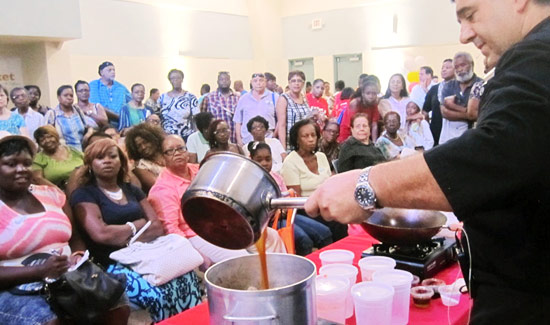 Diabetes is now considered a “national epidemic” in The Bahamas and is the fifth-leading cause of death for all ages locally with a rate of 29.2 deaths per 100,000 persons annually, Minister of Health Dr. Perry Gomez said Tuesday.
Diabetes is now considered a “national epidemic” in The Bahamas and is the fifth-leading cause of death for all ages locally with a rate of 29.2 deaths per 100,000 persons annually, Minister of Health Dr. Perry Gomez said Tuesday.
Dr. Gomez said the prevention and/or reduction in the number of diabetic cases in The Bahamas “deserves our special attention if we are to bring the numbers down to a more manageable level.”
“As Minister of Health, I am therefore committed to ensuring that available resources and manpower will be wisely used to assist in minimising the escalation of the disease,” Dr. Gomez added.
Addressing the Continuing Medical Education Department/Department of Surgery’s Diabetic Foot Symposium at the College of The Bahamas’ Grosvenor Close Campus, Dr. Gomez challenged healthcare professionals “to endeavour to do more in the prevention of this non-communicable disease.”
(The Symposium was held in conjunction with the Princess Margaret Hospital and the University of the West Indies School of Clinical Medicine and Research, Bahamas Campus.)
Dr. Gomez said statistics from the Princess Margaret Hospital show that there was an average of 100 “lower extremity amputations” in The Bahamas from the period 2002-2006, and that there were 165 below the knee amputations in 2002 alone.
The Health Minister said the rates could be higher as figures from the Rand Memorial Hospital in Freeport, Grand Bahama, and Doctors Hospital in New Providence have not been included.
“These numbers represent a significant number of limbs lost, and lives that are irrevocably changed,” Dr. Gomez said. “Surely, these rates are unacceptable. The time has come for us to focus on prevention and education of the citizens of this country.
“We are aware that this disease can be contained by making lifestyle changes. This symposium will address the issues of prevention and treatment and focus on the path to change,” Dr. Gomez added.
Dr. Gomez said the loss of limbs to amputation diminishes the quality of life for most amputees. He said the statistics regarding amputations were particularly significant given the fact that diabetes can be prevented.
The symposium, held under the theme: “Diabetic Foot 101: Saving Legs, Saving Lives,” would address five key areas to which the Ministry of Health was “committed,” Dr. Gomez said.
These include discussions on diabetic peripheral neuropathy; comprehensive foot examinations; healing diabetic foot ulcers, and treating diabetic foot infections. The Diabetic Foot, is It Worth Saving, will also be included in the discussions.
Presenters included Drs. Frederick Smith, Nephrologist; Monique Mitchell, Podiatrist; James Iferenta, Emergency medicine; Dr. Delton Farquharson, Surgeon and Dr. Desmond Bell, CEO of the Save A leg, Save A Life Foundation.
“This Diabetic Foot Symposium is designed to create an awareness of the devastating impact of diabetic foot complications and to improve the skills of healthcare professionals in preventing and managing the complications of the disease.
“My heartfelt thanks to the organisers, international and local presenters and all participants for tackling this complication of diabetes head on, ensuring that the country will be the beneficiary of current knowledge and skills for the containment of this disease,” Dr. Gomez added.
By Matt Maura
Bahamas Information Services



